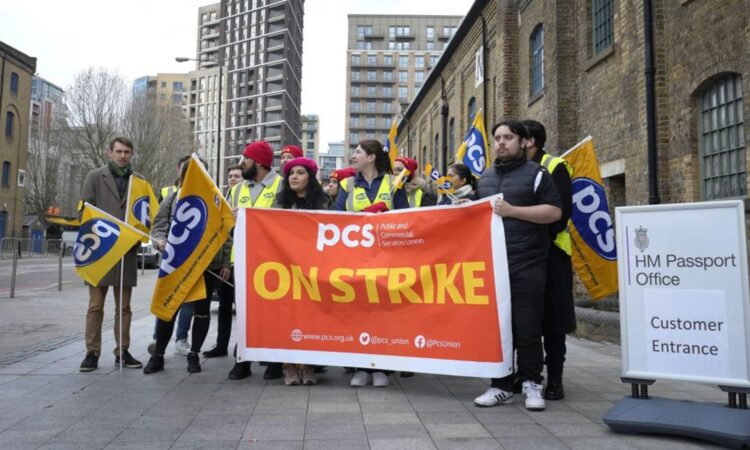UK civil servants hold national strike over pay pensions and jobs, as Tory government refuses concessions

After months of sitting on a massive strike mandate, the Public and Commercial Services (PCS) union staged only its third national strike of civil servants on April 28.
The strike involved 130,000 civil service workers in 132 government departments who walked out in an ongoing fight to win a pay rise. In April, the government offered workers a well below inflation pay deal of between 4.5 and 5 percent for this financial year, after suffering an imposed pay cut last year of just 2 percent. This as inflation has soared into double digits with the Retail Prices Index measure still at 13.4 for February. Since 2010 civil servants have experienced a 20 percent real terms collapse in pay, even before the current inflationary surge.
A recent PCS survey found that thousands of its members are struggling amid an escalating cost of living crisis. The survey of 35,568 members showed one in five Department of Work and Pensions (DWP) workers were in receipt of benefits, including Universal Credit, to supplement their wages. Seven percent of respondents have foodbanks or a foodshare system at work, 12 percent have a second or third job to boost their income. 11 percent had used foodbanks in the 12 months (up from 8 percent last year).
Previously the PCS called out its members on strike in separate 24-hour actions on February 1 and March 15, where there was industrial action ballot turnouts above 50 percent required under anti-strike legislation.
As is the common experiences of the trade union in every sector, the PCS is not calling for an above inflation pay deal, instead its claim is for a 10 percent rise and a living wage of “at least £15 an hour”. This is less than even the official measure of inflation used by the government, CPI, which has been surging for months, remaining above 10 percent for the last two months.
Civil servants not only face continual pay restraint, but their entire livelihoods being destroyed. In May 2022, the then government of Boris Johnson outlined plans to slash 91,000 jobs by 2025, a fifth of the entire civil service workforce.
While not committing to this number in public, ministers in Rishi Sunak’s government have declared they will slash headcount. Asked in January by the Public Administration and Constitutional Affairs Select Committee whether the government was still committed to reducing the civil service workforce, senior minister Oliver Dowden said, “Yes, is the short answer”, adding, “I’m determined to ensure we actually achieve a reduction… and a reduction in budget commensurate with that.” He declared, “the only difference” between Johnson’s plan and Sunak’s is that “we will be driven by outcomes”. These cost savings were “going to force better ways of working and certainly reduction in headcount as well”.














